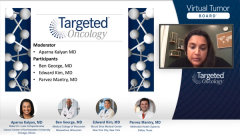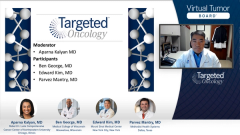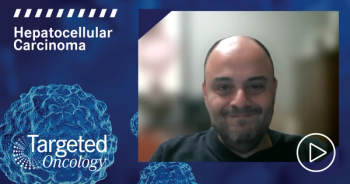
Unresectable HCC: Interpreting Data From the IMbrave150 Trial
A panel of experts review data from the IMbrave150 trial of atezolizumab plus bevacizumab in unresectable hepatocellular carcinoma and consider implications for treatment.
Episodes in this series

Transcript:
Aparna Kalyan, MD: The IMbrave150, as many of us know, is a phase 3 trial looking at the combination of atezolizumab plus bevacizumab in unresectable HCC [hepatocellular carcinoma]. Patients could not have received prior systemic therapy, and they were randomized in a 2:1 fashion to either the combination arm or sorafenib, which at that time was the standard of care for these patients. The study was designed with a co-primary end point of overall survival and PFS [progression-free survival] with an intention-to-treat arm. And patients were continued on study until either toxicity or loss of clinical benefit with progression seen on imaging. This is a look at the baseline demographics, and again, if we look here, we can see that this is really primarily geared with Child-Pugh A patients, with the majority of them having an A5 score. Then if we look at the BCLC [Barcelona Clinic Liver Cancer] staging, a lot of them did have BCLC-C, and I would point out at this point that BCLC-C doesn’t necessarily mean that it’s automatically metastatic because it’s variable based on whether there is vascular involvement. And patients did have extrahepatic spread in over 60% of cases.
When we look at the results of this, the confirmed overall response rate for the combination arm was roughly 29.8%, and then when we look at the modified RECIST, it was 35.4% vs 13% for the sorafenib arm. Then we look at the duration of response, it was roughly 18 months versus 14.9 months. Now the median overall survival was updated earlier this year with 29.2 months for the atezo-bev [atezolizumab plus bevacizumab] arm vs 13.4 months for the sorafenib arm, and the PFS was roughly 6.8 with a combination compared to sorafenib at 4.3 months. Based on these results, it met the preset statistical end point, leading to the NCCN [National Comprehensive Cancer Network] giving it frontline approval. Now, when we look at the safety outcomes, again, none of this was unexpected. A lot of us have been using bevacizumab in multiple other cancer types, and we’re used to seeing the expected adverse effects of hypertension and bleeding. And very briefly, I want to also talk about the REFLECT trial, but before I do, I want to get thoughts from the panel about this study and what they think about it.
Edward Kim, MD: One of the questions that frequently comes up is that when you look at that sorafenib median overall survival arm, it’s certainly much higher than what was published in SHARP, the Asia-Pacific trial, at almost 11 months. Maybe patient selection here is not as sick of a population. But regardless, I do think that the 19 month median overall survival in the atezolizumab and bevacizumab arm is quite impressive.
Ben George, MD: Some of it is post-progression therapy in the sorafenib arm too. At the time that the IMbrave study was done, there were probably more options for the control arm, sorafenib patients as well, as opposed to what was available at the time of the SHARP trial. Regardless, I can’t argue with a hazard ratio of 0.58, on that study for overall survival. Again, I’d like to hear Dr Kalyan’s thoughts as well.
Aparna Kalyan, MD: We were all very excited by this. There’s finally something that pushed sorafenib off the pedestal that it was on. This is a population that clearly is immunogenically responsive. This has been shown time and time again, and for the first time, we understand that perhaps the combination of immunotherapy with some sort of a VEGF inhibition because of the vascularity of this disease is important, and you’re absolutely right, Dr George, that with a hazard ratio of 0.58, nobody can argue with that. The caveat is that there are about 15% to 20% of patients who we’re not able to give this combination, primarily because of the Avastin [bevacizumab], but certainly people who have underlying autoimmune hepatitis, for example, who get HCC because of that. And Dr George had brought this up, about using the TKI [tyrosine kinase inhibitor] route as an option. I know this is not pertinent to the case we just discussed, but if there’s any utility or any role of transplantation down the line, the data in that space are very limited, in terms of using immunotherapy and then coming back to transplantation. So if there’s any possibility the patient could be considered for transplant, we should keep the door open by using a TKI, at least for now. That maychange as we go through.
Transcript edited for clarity.













































